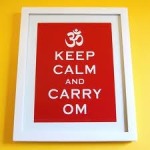Blog Archives
Too tired to sleep? That’s me!
I don’t know about you but I have been feeling REALLY tired of late… So I was interested to read an article by Dr John Douillard of lifespa.com where he said:
Insomnia is a condition whereby people think that if they cannot get to sleep they have too much energy. They are often wired and simply cannot fall asleep. What I have found in my clinical practice is that most people who cannot sleep at night are, in fact, exhausted. Odd as it may seem, the body needs energy to calm or sedate itself for sleep. Without energy, we stay awake, “wired and tired”.
That is where I have been for the past few weeks – “wired and tired” – so it is with regret that I have to tell you I have had to go back onto my Bipolar medication to see if that would bring my bodyclock back into balance again. I was so excited to tell you about coming off the meds and feel like a bit of a fool for having to go back on them but I guess I really do have an illness as I had been feeling distinctly unwell again with symptoms of mania rising up quickly.
So now I am planning to try a few of Dr Douillard’s suggestions:
- Meditate twice daily. Sleep research studies have shown that meditation reduces the time of sleep onset to normal in patients with insomnia.
- Maintain a regular daily routine: rise, meditate, eat sleep, work exercise and play at the same time every day. Go to bed by 10pm, which is the end of the Kapha period when the mind and body are naturally drowsier. If you are not currently accustomed to being regular about your routine, you may want to start by first writing down a schedule to follow for the first few weeks.
- Eat Vata-pacifying Foods: If the mind is very active at bedtime follow a Vata-pacifying diet or light Vata diet. Have an early, light supper, such as soup or hot cereal, toast, warm milk at least three hours before bedtime.
- Enjoy dynamic and fulfilling activities during the day.
- Be sure to enjoy some light entertainment each day. Humorous books, movies or being in pleasant situations with family and friends will all fulfill this recommendation.
- Be Calm: To the extent possible, avoid situations which tend to cause anxiety, worry, or anger.
I hope that these suggestions will help me to regulate my mood swings which will, in turn, mean I can get a good night’s sleep for a change! After all, studies link disturbed sleep with increased cortisol production (a stress hormone) and weight gain and I definitely don’t want that! I have other plans to help bring my life back into balance and I will tell you about these soon … so keep reading!
Victoria
Keep calm and carry on … or OM!
Most people know that wartime saying ‘Keep Calm and Carry On’ and some people I know (I’m thinking of you Ruth!) even have it up on their wall at home as a constant reminder to keep calm in the chaos of modern life. We no longer have the threat of invasion by warring factions to worry us but that doesn’t mean we’re not still stressed. In fact, our cortisol levels (hormone produced by our adrenal glands in response to stress) are higher than ever! Now, small increases of cortisol have some positive effects:
- A quick burst of energy for survival reasons
- Heightened memory functions
- A burst of increased immunity
- Lower sensitivity to pain
- Helps maintain homeostasis in the body
While cortisol is an important and helpful part of the body’s response to stress, it’s important that the body’s relaxation response becomes activated so the body’s functions can return to normal following a stressful event. Unfortunately, in our current high-stress culture, the body’s stress response is activated so often that the body doesn’t always have a chance to return to normal, resulting in a state of chronic stress.
To keep cortisol levels healthy and under control, the body’s relaxation response should be activated after the fight or flight response occurs. You can learn to relax your body with various stress management techniques, and you can make lifestyle changes in order to keep your body from reacting to stress in the first place. The following have been found by many to be very helpful in relaxing the body and mind, aiding the body in maintaining healthy cortisol levels:
- Guided Imagery
- Journaling
- Self-Hypnosis
- Exercise
- Yoga
- Breathing Exercises
- Meditation
I intend to discuss these 7 techniques in more detail during the following week, because I have used them ALL at some time, and want to share what I found. In the meantime I will leave you with the reason why I am doing this series of relaxation techniques:
After another late night working on my new Pilates Instructor Training manual I put my laptop down after 1am and turned my bedroom light off at 2.05am only to wake up, in a complete cold-sweat panic, at 6.15am! I just had so much cortisol running through my system that I couldn’t settle back down to sleep and instead I lay there churning over old conversations and thinking “I should’ve said this” or “I should’ve done that” and getting myself into a right old pickle! So, still feeling very physically tired, I read a couple of chapters of an inane romantic novel to try and lull me back to sleep. But, to no avail. I got up at 9am and have spent the whole day wondering around like a zombie and knowing that I have to be on ‘top-form’ tonight for my Pilates and yoga classes in Edenmore which is causing the stress levels to rise again and the whole pattern to repeat itself…
So, I’m signing off to do a quick restorative yoga practice just for me which will hopefully get the hormones back under control! Either that or I’ll start crying. And I can’t do that to my wonderful students. So, I’ll just ‘Keep Calm and Carry OM’ instead.
Victoria
Busy, busy, busy…
I was so busy yesterday interviewing for a new freelance trainer position and preparing for a 2 -hour stress management workshop today that I forgot to post yesterday. I also seemed to forget to sleep! Ironically, delivering a stress management can be very stressful and I was running around at after 1am getting worksheets and handouts in order. Then I was up with the lark to make the long drive to Belturbet, Co. Cavan for my session on ‘Stretch for Stress Relief’ with Me Unltd. It was well worth the journey! The ladies were lovely and fully engaged with all the physical activity and especially with the chocolate meditation…
For those who don’t know what this is, it is a special mindfulness meditation technique where you take around 10 – 20 minutes to eat ONE piece of chocolate. It sounds strange, but by bringing all of your awareness to the sensations that come up in your body when you eat your one piece of chocolate, you find it is the tastiest piece of chocolate you have ever eaten in your life. You also find you are full up after your one little bit and no longer want to devour the entire chocolate aisle at Tescos!
As for those who are wondering how I could deliver a chocolate meditation when I’m on a raw food diet – don’t panic. I had brought strawberries with me as well and I tucked into that. I also tucked into a fabulous salad when I came home. This diet is the easiest thing I’ve ever done and I can’t believe that I didn’t do it sooner!
Victoria
Forgot to post … already!
I got into bed at 1.37am last night and suddenly remembered that I hadn’t blogged and I was so annoyed at failing my daily blog habit so soon after starting it that I then lay awake for another hour or so trying to think how I could make this one the best blog I’d ever posted, just to make up for not doing it. Unfortunately, I then fell asleep and promptly forgot all those pearls of wisdom that had popped into my head during the wee small hours. Instead, I woke up with a headache and a vague sense of having forgotten something. So, my remedy for this is to blog about what I do when I can’t get to sleep:

Vic’s Get to Sleep Guide –
1. Keep a notepad by your bed to write down any of those pesky eye-opening thoughts that would otherwise bug you for hours.
2. Keep your feet warm! Bed socks are good or some easy yoga toe wiggling and ankle circling as well as pointing and flexing the feet.
3. ONE drop of lavender essential oil on your pillow or my lovely lavender-filled eye masks that we use in savasana. BTW – if you use more than one drop of lavender essential oil it actually starts to work as a stimulant and you will find it doesn’t help you sleep at all!
4. Tell your sleeping partner 3 things that you are grateful for today and listen to him/her tell their 3 things. Sharing positive thoughts before bed, rather than spilling your guts about all your problems, will help you drift off to a calm sleep, rather than fill your head with crazy dreams about what you might want to do to your boss/friend/child/pet/etc.
5. Breathe in and out through the nose and count down from 40 to 1. If you reach 1 you can then count back up again but I usually find I’ve drifted off long before I reach 20!
Hope this makes up for not blogging yesterday,
Victoria


